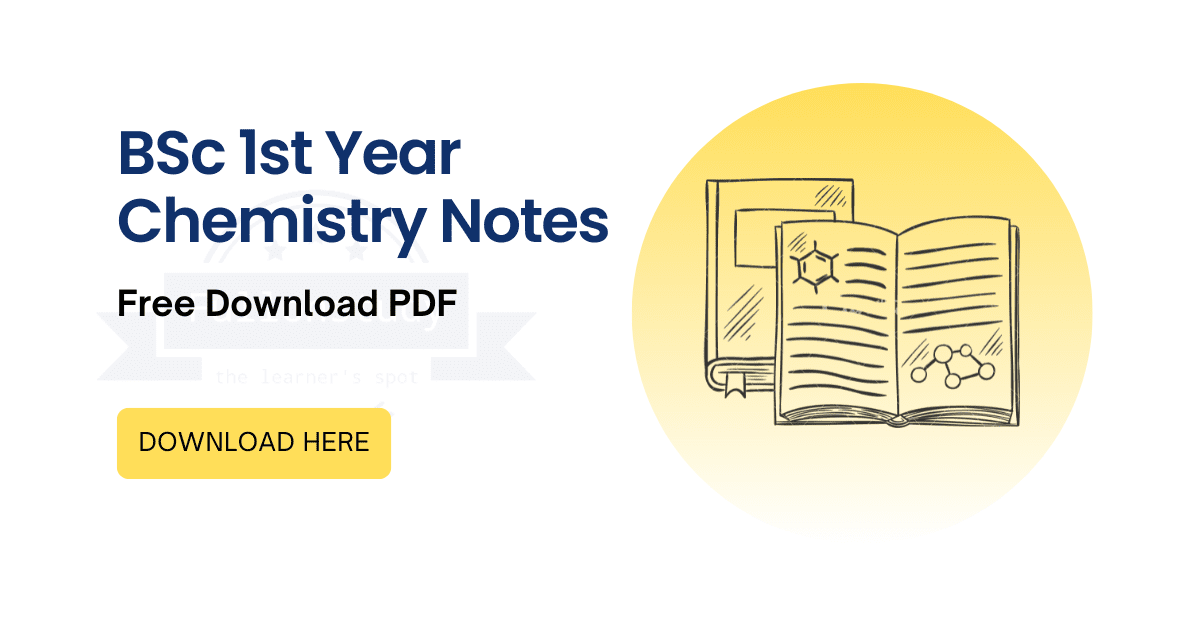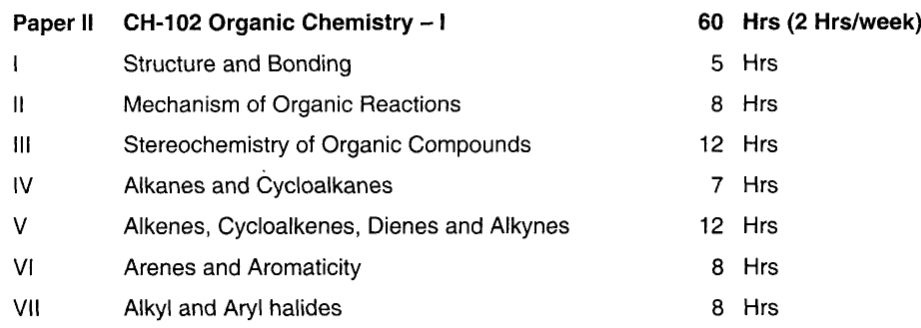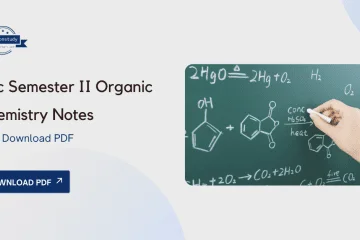BSc or Bachelor of Science is a 3 year undergraduate degree program widely offered by universities across the country.
In this post, we are here with BSc 1st year chemistry notes in pdf format. These notes are available in English language and can be downloaded for free.
We have used the syllabus provided by UGC in their website in order to craft these notes so as to make it available for majority of students across the country.
Navigate to Section:
BSc 1st Year Chemistry Notes
The BSc 1st-year Chemistry syllabus is typically divided into three key areas: Inorganic, Organic, and Physical Chemistry. Below is a brief outline of the topics covered in each section.
For each key areas you will also find the detailed syllabus as proposed by University Grants Commission (UGC).
Inorganic Chemistry Notes for BSc 1st Year
The syllabus of inorganic chemistry for BSc 1st year comprises the following topics: Atomic Structure, Periodic Properties, Chemical Bonding, s-block elements, p-block elements and Chemistry of Noble gases.
Click on the below links to download the notes:
- Atomic StructureAtomic Structure
- Periodic PropertiesPeriodic Properties
- Chemical BondingChemical Bonding
- s-Block Elementss-Block Elements
- p-Block Elementsp-Block Elements
- Chemistry of Noble GasesNEWChemistry of Noble Gases
Organic Chemistry Notes for BSc 1st Year
The Organic Chemistry syllabus for BSc 1st year includes topics such as Structure and Bonding, Mechanism of Organic Reactions, Stereochemistry of Organic Compounds, Alkanes and Cycloalkanes, Alkenes, Cycloalkenes, Dienes and Alkynes, Arenes and Aromaticity, and Alkyl and Aryl Halides.
Click on the below links to download the notes:
- Structure and BondingStructure and Bonding
- Mechanism of Organic ReactionsMechanism of Organic Reactions
- Chemical Stereochemistry of Organic CompoundsChemical Stereochemistry of Organic Compounds
- Alkanes and CycloalkanesAlkanes and Cycloalkanes
- Alkenes, Cycloalkenes, Dienes, and AlkynesAlkenes, Cycloalkenes, Dienes, and Alkynes
- Arenes and AromaticityArenes and Aromaticity
- Alkyl and Aryl HalidesAlkyl and Aryl Halides
Physical Chemistry Notes for BSc 1st Year
The BSc 1st-year Physical Chemistry syllabus covers a range of topics, including Mathematical Concepts and Computers, Chemical Kinetics, Catalysts and Catalysis, Colloidal State, Gaseous State, Liquid State, and Solid State.
Click on the below links to download the notes:
- Mathematical Concepts & ComputersMathematical Concepts & Computers
- Chemical KineticsChemical Kinetics
- Catalyst & CatalysisCatalyst & Catalysis
- Colloidal StateColloidal State
- Gaseous StateGaseous State
- Liquid StateLiquid State
- Solid StateSolid State
Additional Study Resources for BSc 1st Year
For in-depth understanding, we recommend combining these notes with standard textbooks like ‘Physical Chemistry by P.W. Atkins’ and ‘Organic Chemistry by Morrison and Boyd.
Some of the standard Chemistry textbooks for BSc 1st year students are:
R.L. Madan, Chemistry for degree students, S. Chand & Company. (Available on Amazon)
Satya Prakash, Modern Inorganic Chemistry, S. Chand & Company (Available on Flipkart)
S.M. Mukerji and Singh. Reaction mechanism in Organic Chemistry. (Available on Amazon)
If you have any book recommendations or suggestions, feel free to share them in the comments below!
FAQs
Are these BSc 1st Year Chemistry notes free to download?
Yes, all the Chemistry notes provided here are completely free to download. They are designed to help students with their studies without any cost.
Can I use these notes for my university exams?
Absolutely! These notes are based on the UGC syllabus and are suitable for most Indian universities.
However, the notes provided here are intended to serve as a quick revision resource for BSc 1st-year Chemistry students. While they cover key concepts and topics aligned with the UGC syllabus, they are not a substitute for comprehensive study materials or textbooks. For exam-related preparation, we recommend using these notes alongside your prescribed textbooks, reference materials, and practical guides to ensure thorough understanding and success.
Are these notes sufficient for preparing for BSc 1st-year Chemistry exams?
While these notes are comprehensive, we recommend using them alongside your textbooks, practical manuals, and previous years’ question papers for the best preparation.
Can I share these notes with my classmates?
Yes, feel free to share the download links or PDFs with your classmates to help them with their studies.
What should I do if I face issues downloading the PDFs?
Yes, feel free to share the download links or PDFs with your classmates to help them with their studies.
We hope these notes simplify your Chemistry studies and help you excel in your exams. Don’t forget to bookmark this page for future reference and share it with your classmates. If you found this helpful, let us know in the comments!
Disclaimer: These notes are designed as a quick reference and revision tool to help you recall important concepts efficiently. They provide a summary of key topics to aid in understanding and retention. For a deeper and more thorough understanding, it is strongly recommended to consult standard textbooks, authoritative sources, or seek guidance from subject matter experts.
While every effort has been made to ensure the accuracy and relevance of these notes, we cannot guarantee they are completely error-free. Users are encouraged to cross-check the information and use these notes at their discretion. We are not responsible for any inaccuracies or the consequences arising from their use.
About the Author(s):
Fullonstudy Team is a passionate team of educators, content creators, and students, committed to bringing you reliable, up-to-date, and accessible study resources. With a blend of academic knowledge, teaching experience, and a focus on simplifying complex topics, we are here to help guide you through your educational journey.
Other key team members who influence the content you read on our website include those in charge of research, content writing, editing, curriculum design, website development, and user experience. We also collaborate with experts in various academic fields to ensure the accuracy and relevance of our resources.
Manisha Joshi is currently pursuing MSc in Physics from Kumaun University, Nainital. She also holds a BSc in Physics, Chemistry, and Mathematics, providing her with a strong multidisciplinary foundation.









